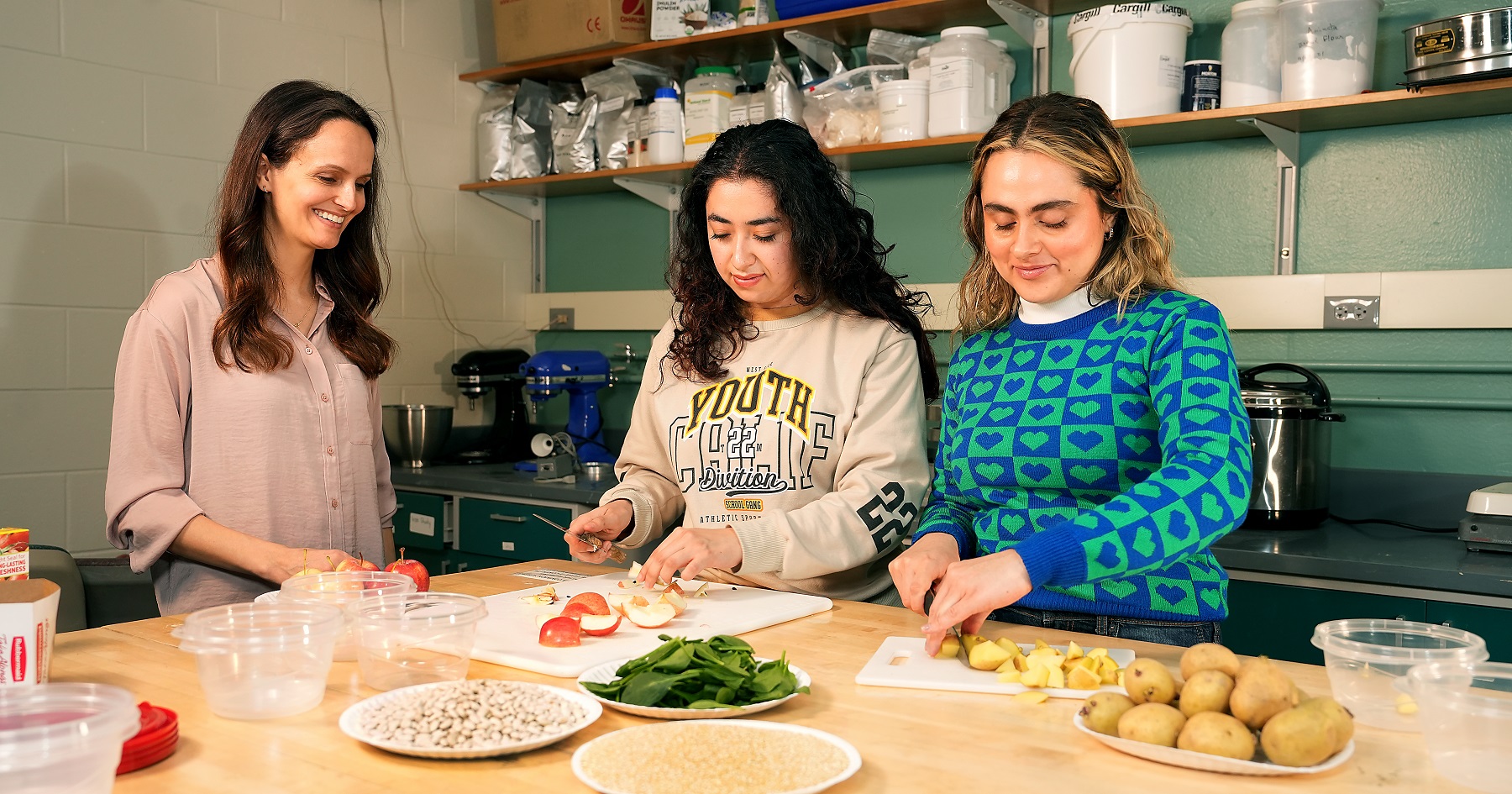Promoting beneficial gut microbes with whole-food dietary fiber
Promoting beneficial gut microbes with whole-food dietary fiber
Americans generally consume about half the recommended daily dietary fiber requirement.
“There’s a public health need to increase dietary fiber intake,” said Bruce Hamaker, Distinguished Professor of Food Science at Purdue University. “Traditionally, dietary fibers, by and large, come from plant-based foods.” These include certain grains, fruits and vegetables, legumes, and to a lesser extent tubers such as potatoes.
A 2,000-calorie daily diet would call for 28 grams of fiber, the equivalent of a combination of one cup of cooked beans, two cups of brown rice, one cup of broccoli and one banana. Not all fibers are created equal, however.
The production of processed foods often involves removing the original fiber content and sometimes replacing it with a different kind of fiber. Food producers often add inulin as an alternative. But inulin is a soluble fiber that is ill suited for supporting a particular group of beneficial gut bacteria, Clostridia. The whole-food fibers it replaces naturally contain both soluble and insoluble fibers that promote Clostridia, which supports anti-inflammatory health outcomes.
Now, Hamaker and Thaisa Cantu-Jungles, research assistant professor of food science at Purdue, have launched a project to compare the gut-health impact of whole-food fibers and inulin. Their project is funded by a grant from the U.S. Department of Agriculture National Institute of Food and Agriculture.
“This study is a comparison between inulin and a fiber blend from whole foods that is more suitable to promote this specific group of bacteria,” Cantu-Jungles said. “Data show that the beneficial Clostridia are important specifically for metabolic diseases like obesity.”
Consumers have come to prefer eating refined-grain foods that are missing the fibers from whole foods, noted Hamaker, who directs the Whistler Center for Carbohydrate Research. The beneficial Clostridia, however, prefers to feed on soluble and insoluble fibers that are entrapped in the plant cell wall matrix. “We predict that trying to compensate for the lack of fibers in the diet with inulin could further marginalize that important group of health-related microbes,” he said.
 Thaisa Cantu-Jungles (left), research assistant professor of food science at Purdue University, in the research kitchen with Maria Alejandra Osorio Marulanda (center) and Lauren Yepes Fernandez. Marulanda and Fernandez are visiting scholars in food science at Purdue.
Thaisa Cantu-Jungles (left), research assistant professor of food science at Purdue University, in the research kitchen with Maria Alejandra Osorio Marulanda (center) and Lauren Yepes Fernandez. Marulanda and Fernandez are visiting scholars in food science at Purdue. In their new study, Hamaker and Cantu-Jungles seek to clearly establish whether cell-wall-based plant fibers have a key dietary role in supporting the Clostridia bacteria that are critical for good gut health.
“Good gut health means low inflammation and good barrier function, the epithelial cell barrier between the gut and the body,” Hamaker said. The barrier prevents toxins in the gut from freely moving into the body and causing problems such as chronic inflammation, which is linked to various metabolic diseases.
“Most fibers that come from whole foods are cell-wall-based plant fibers. That’s the food tissue that we’re eating in cereal brans, for instance,” Hamaker said. “Most of the time they’re insoluble fibers.”
Many trillions of the bacteria that make their home in the human gut depend on dietary fibers for their food.
“It’s a highly competitive environment for bacteria to access carbohydrates and use them for food,” Hamaker said. Previous work in his lab on plant cell-wall-based fibers showed that they support Clostridial bacteria.
“We don’t want to make inulin out to be the bad guy here, but it does not do the same thing as whole-food fibers,” Hamaker said.
The project will entail putting together an optimized combination of whole-food fibers, then testing it in the laboratory and in a clinical study. The clinical study at Purdue will involve overweight prediabetic individuals who are at risk for metabolic-based diseases.
Blood samples taken during the clinical study will be analyzed at Rush University Medical School in Chicago. Rush personnel will screen the samples for markers of systemic inflammation, for bacteria that harmfully translocate from the gut to the bloodstream, and for markers related to barrier integrity. Stool samples will be analyzed at Purdue for gut bacterial community shifts and metabolites from bacterial utilization of fiber.
Cantu-Jungles and Hamaker expect their study to clarify how whole-food dietary fibers and their mixtures may more effectively promote beneficial Clostridial bacteria.
We are trying to predictively and effectively promote beneficial gut microbes, with an ultimate goal to improve health."
- Thaisa Cantu-Jungles, research assistant professor of food science






